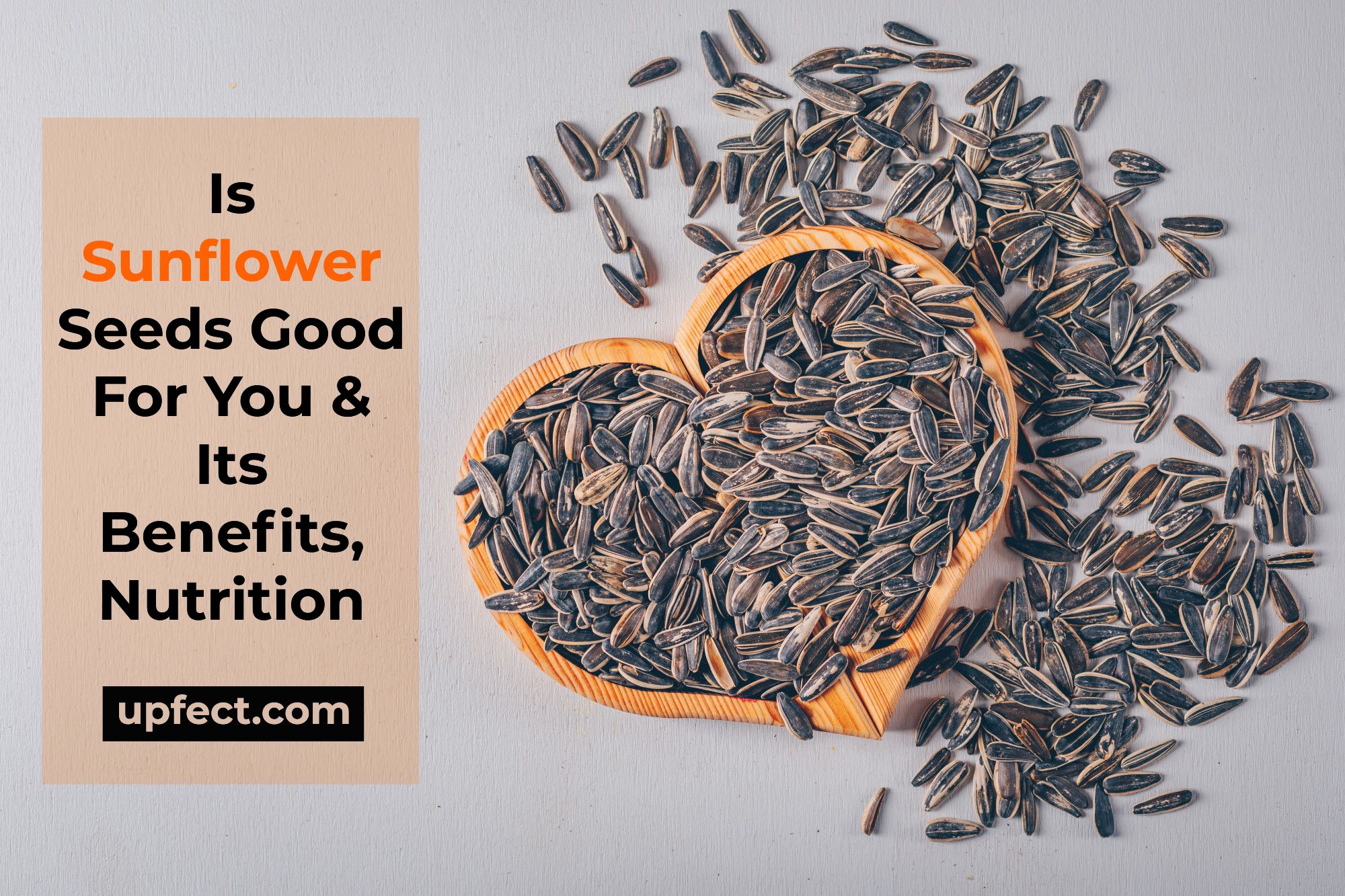According to the USDA, Here is the sunflower seeds’ nutrition for a serving of (100 grams):
- Calories: 582
- Protein: 19.3 grams
- Total Fat: 49.8 grams
- Saturated Fat: 4.5 grams
- Total Carbohydrate: 24.1 grams
- Dietary Fiber: 11.1 grams
- Sugar: 2.73 grams
- Cholesterol: 0 mg
- Sodium: 3 mg
- Potassium: 850 mg
- Iron: 5.29 mg
- Magnesium: 129 mg
- Calcium: 70 mg
- Vitamin C: 1.4 g
- Vitamin B6: 0.804
- Vitamin E: 26.1 mg
Sunflower Seeds Benefits
May Improve Heart Health
Sunflower Seeds are good for you being a good source of niacin which reduces the total cholesterol levels and the risk of heart diseases. The monounsaturated and polyunsaturated fats present in sunflower seed show a clear health benefit, especially in the case of heart disease.
A study from Harvard University found that- including sunflower seed- is associated with a lower risk of cardiovascular disease, as well as CVD risk factors such as high cholesterol and blood pressure.
Sunflower Seeds Reducing Inflammation
Sunflower Seeds contain antioxidants, vitamin E, flavonoids, and other plant compounds that can reduce the risk of inflammation in many chronic diseases. It is good for you because they are rich in selenium, which plays an important role in fighting inflammation and infection as well as boosting immunity so that your body responds appropriately to any intruders. Experts have found that eating sunflower seeds 3-4 times a week as part of any meal significantly reduces the risk of chronic conditions such as joint pain or arthritis.
Supporting The Immune System
Sunflower Seeds are beneficial for health as they contain vitamin E, zinc, and selenium that can support your immune system and boost your energy levels. Zinc presence in sunflower seeds can help prevent infections and increase overall immunity. Selenium reduces inflammation and enhances immunity. It also helps to reduce oxidative stress from free radicals.
Reducing Cancer Risk
Although there is nothing that can stop the growth of cancer cells, dietary changes can certainly reduce cancer. The sunflower seed plant is a rich source of sterol, which is a protection against breast cancer. Eating these seeds also reduces the chances of colon cancer. It suppresses the growth of tumor cells.
Sunflower Seeds Help in Weight Loss
Sunflower Seeds make it a perfect food for weight loss. Because they contain essential vitamins and minerals and are very low in calories. It is good for you because they are rich in protein and fiber which keep our stomachs full for a long time, thus reducing our food intake and ultimately reducing the number of calories we consume. As a result, it helps in weight loss.
May Promote Healthy Skin
The antibacterial and antifungal activity of sunflower seeds presents infection, leaving our skin clean. It is rich in excellent sources of fatty acids like oleic and linoleic, both of which help in the formation of collagen, providing smooth, radiant skin. Rich in nutrients, sunflower seed provide enough nutrients and moisture to keep our skin soft, smooth, and healthy.
According to the US Department of Agriculture, sunflower seed are high in zinc and vitamin E. Both can help protect skin cells.
Managing Blood Sugar Levels
Sunflower Seeds have a role in lowering glucose levels and can be used to treat type 2 diabetes. Sunflower Seeds will not only curb your appetite but also contract your blood sugar levels. It contain vitamin E, vitamin B-1, antioxidants, protein, fiber, and copper all of which help control blood sugar levels.
Boost Brain Function
Sunflower Seeds contain vitamin B6 which helps in improving mood and concentration and enhancing memory. It also releases serotonin and norepinephrine in the human body.
Managing Diabetes
Sunflower Seeds have a role in lowering glucose levels and can be used to treat type 2 diabetes. Sunflower Seeds have benefits in controlling diabetes in patients with type 2 diabetes. Chlorogenic acid is a plant compound present in sunflower seeds that have a blood sugar-lowering effect. As a result, diabetes is under control.
A 2016 study published in the Journal of Chemical and Pharmaceutical Research examined the effects of 1 ounce daily serving of sunflower seeds on blood sugar levels and cholesterol in a small group of postmenopausal women with type 2 diabetes.
Helps in the Treatment of Anemia
Sunflower Seeds are a good source of iron. Which can help people with anemia. It can be part of a balanced diet to help prevent and treat anemia, but are not a stand-alone treatment for anemia. Anemia is a condition in which the body does not have enough healthy red blood cells to carry oxygen to the body’s tissues. Anemia can be caused by a number of factors such as iron deficiency, vitamin B12 deficiency or folic acid deficiency.
They are an excellent source of iron, vitamin B6 and folate, which provide nutrients essential for healthy red blood cell production. Iron is essential for the production of hemoglobin, a protein in red blood cells that plays an important role in carrying oxygen throughout the body. Vitamin B6 is required for the production of hemoglobin, while folate is required for the formation of new cells, including red blood cells.
Sunflower Seeds Side Effects
Sunflower seeds are a source of saturated fatty acids, which when consumed in excess can increase the levels of unhealthy low-density lipoprotein or LDL cholesterol in the body.
People with allergies to sunflower seed may experience symptoms such as vomiting, rash, shortness of breath, and itching around the mouth.
It may not be as healthy as you think. This is because researchers have found that sunflower seed are often contaminated by a toxin that can lead to liver cancer.




